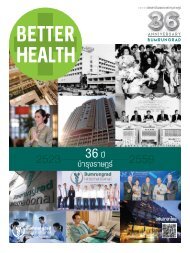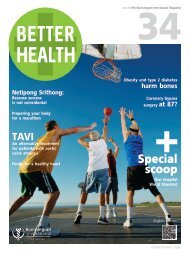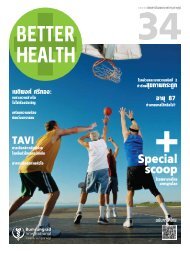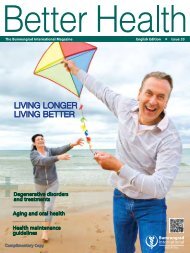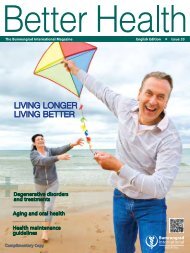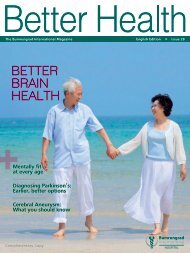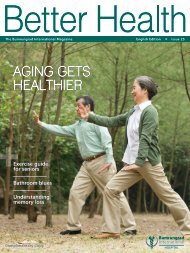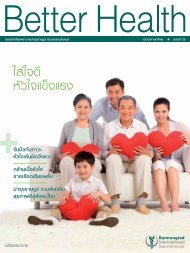All pdf BH Issue 33 Eng
You also want an ePaper? Increase the reach of your titles
YUMPU automatically turns print PDFs into web optimized ePapers that Google loves.
are a group that changes in every aspect – whether<br />
physically, mentally, or socially due to aging. Therefore,<br />
they need a special kind of care,” explains Dr. Lily.<br />
In order to deliver the best geriatric care to older<br />
people of various ages, we divide them into three groups:<br />
The youngest old (60 to 69 years) are<br />
those who have just entered older age,<br />
most of whom are still healthy, though<br />
some may have underlying diseases<br />
such as diabetes or elevated blood<br />
pressure. Care for them aims to assess<br />
and prevent the future risk of diseases<br />
such as osteoporosis, dementia, stroke,<br />
or heart disease.<br />
The middle old (70 to 85 years) is when the presence<br />
of chronic diseases starts to increase, while the ability<br />
to self-care starts to decrease. People in<br />
this range, generally, want to rely on<br />
themselves as much as possible. The<br />
goal of care is to maintain a good<br />
quality of life, paying particular<br />
attention to skeletal and muscular<br />
problems. Care includes reducing joint<br />
degeneration from arthritis and helping<br />
maintain mobility. There is also a focus on nutrition,<br />
especially if people have chewing or swallowing<br />
problems.<br />
The oldest old (86 years and older) is<br />
the time of increasing dependence on<br />
family or caregivers for daily living<br />
and self-care. Care for this group<br />
includes training the caregivers on<br />
nutrition and physical therapy. The<br />
geriatrician and team also serve as<br />
care coordinator between the patient<br />
and their relatives, other caregivers, and other<br />
physicians involved.<br />
the patients’ health and ability to take care of themselves.<br />
A fit 85 year old may be stronger and healthier than a frail<br />
75 year old.”<br />
Medical care for the elderly<br />
Whichever the age group, a significant characteristic of<br />
geriatric care is the coexistence of various diseases and<br />
conditions. Therefore, geriatric medicine requires a holistic<br />
approach to tackle these simultaneous health problems<br />
safely and efficiently.<br />
“To illustrate,” Dr. Lily says, “if an elderly patient has<br />
dizziness, the caregiver knows he or she must call a doctor<br />
but might not know in which field of medicine. Many things<br />
cause dizziness: vertigo, reduced blood flow to the brain,<br />
falling blood pressure, anemia or stress.”<br />
Duplicated medication is a frequent problem because<br />
elderly patients commonly have several doctors treating<br />
several diseases. This can lead to the patient receiving<br />
duplicate prescriptions. “But at Bumrungrad, we have a<br />
clinical pharmacist who reviews all the patient’s medications<br />
comprehensively to avoid duplicate treatments or drug<br />
interactions. Additionally, our pharmacists are aware that<br />
certain drugs are inappropriate for geriatric patients because<br />
of side effects like depression, confusion, or causing falls,”<br />
Dr. Lily says.<br />
Specialists in geriatric medicine work as a collaborative,<br />
interdisciplinary team, careful to ensure that they don’t<br />
prescribe treatments that conflict or duplicate. “Successful<br />
elderly medical care does not consist of individual doctors<br />
working separately, but rather, together as a team.”<br />
Dr. Lily says. “They assess all areas: general health, mental<br />
and emotional health, nutrition, and even the patient’s<br />
living environment, in reducing the risk of falls.”<br />
“At Bumrungrad we place the older person at the center<br />
of our geriatric program and care for them as if they were<br />
part of our own family.” Dr. Lily says. “With the determination<br />
to have good health, along with the assistance of our geriatric<br />
program, the elderly can live long, healthy lives.”<br />
“Age-oriented categorization is not always necessary,<br />
however,” Dr. Lily says. “In practice, doctors base care on<br />
5



